外研版七年级下册Module8 Story time 复习课件(共24张PPT)
文档属性
| 名称 | 外研版七年级下册Module8 Story time 复习课件(共24张PPT) |

|
|
| 格式 | zip | ||
| 文件大小 | 4.0MB | ||
| 资源类型 | 教案 | ||
| 版本资源 | 外研版 | ||
| 科目 | 英语 | ||
| 更新时间 | 2022-07-20 13:04:29 | ||
图片预览

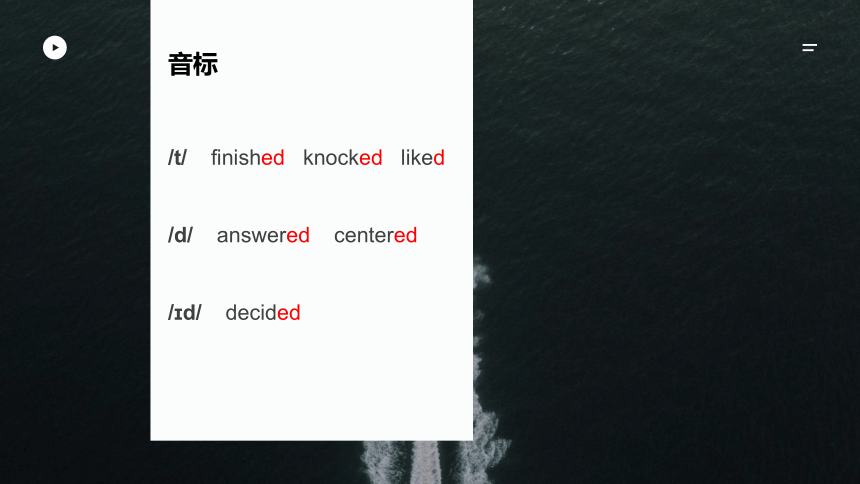


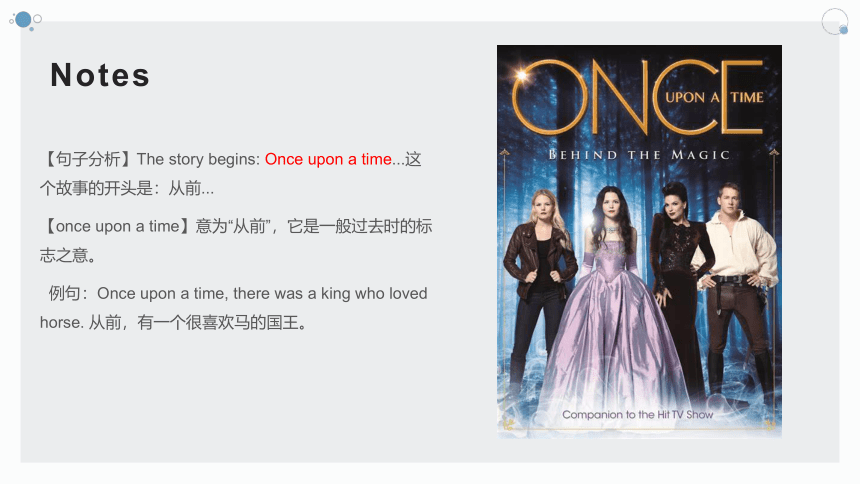
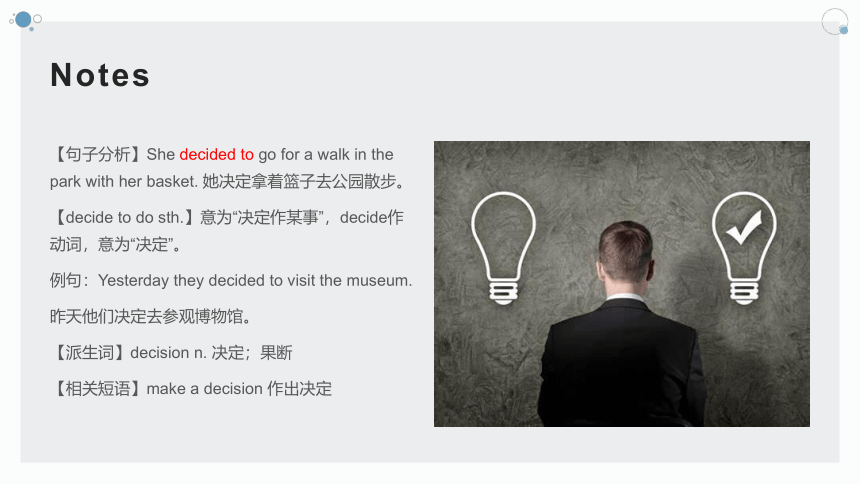
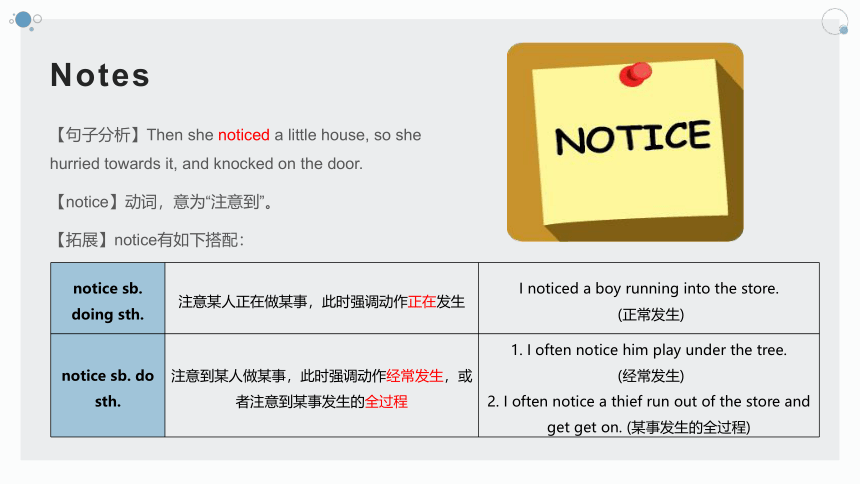

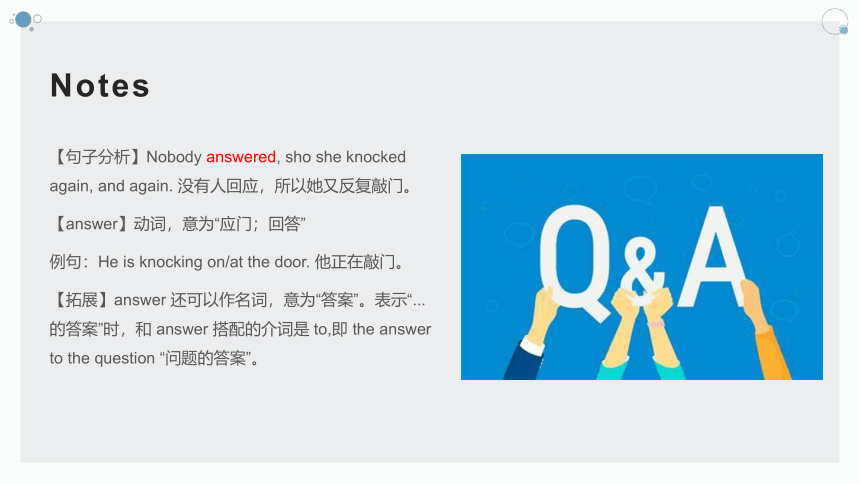
文档简介
(共24张PPT)
Module 8 Story time
/t/ finished knocked liked
/d/ answered centered
/ d/ decided
音标
1 Once upon a time...
1 Once upon a time...
【句子分析】The story begins: Once upon a time...这个故事的开头是:从前...
【once upon a time】意为“从前”,它是一般过去时的标志之意。
例句:Once upon a time, there was a king who loved horse. 从前,有一个很喜欢马的国王。
Notes
【句子分析】She decided to go for a walk in the park with her basket. 她决定拿着篮子去公园散步。
【decide to do sth.】意为“决定作某事”,decide作动词,意为“决定”。
例句:Yesterday they decided to visit the museum.
昨天他们决定去参观博物馆。
【派生词】decision n. 决定;果断
【相关短语】make a decision 作出决定
Notes
【句子分析】Then she noticed a little house, so she hurried towards it, and knocked on the door.
【notice】动词,意为“注意到”。
【拓展】notice有如下搭配:
Notes
notice sb. doing sth. 注意某人正在做某事,此时强调动作正在发生 I noticed a boy running into the store.
(正常发生)
notice sb. do sth. 注意到某人做某事,此时强调动作经常发生,或者注意到某事发生的全过程 1. I often notice him play under the tree.
(经常发生)
2. I often notice a thief run out of the store and get get on. (某事发生的全过程)
【句子分析】Then she noticed a little house, so she hurried towatds it, and knocked on the door. 然后她注意到了一个小房子,所以她飞快地向它跑了过去,并敲了敲门。
【knock】不及物动词,意为“敲”,knock on/at 可以和door搭配。
例句:He is knocking on/at the door. 他正在敲门。
Notes
【句子分析】Nobody answered, sho she knocked again, and again. 没有人回应,所以她又反复敲门。
【answer】动词,意为“应门;回答”
例句:He is knocking on/at the door. 他正在敲门。
【拓展】answer 还可以作名词,意为“答案”。表示“...的答案”时,和 answer 搭配的介词是 to,即 the answer to the question “问题的答案”。
Notes
【句子分析】Goldilocks entered the house and looked into a small room. 金凤花姑娘进了那所房子,向一个小房子里看了过去。
【enter】动词,意为“进入”,相当于go/walk into.
例句:He entered the classroom from the back door and nobody noticed him.
Notes
【句子分析】She picked up the very big bowl but she didn't like it...她拿起那个很大的碗,但是她并不喜欢它...
【pick up】动词短语,意为“捡起;拿起;举起”,它的宾语位置有如下两种情况:
Notes
宾语是名词 该名词可以谓语pick和up之间, 也可以位于pick up之后 pick up the books = pick the books up
宾语是代词 该代词只能谓语pick和up之间 pick them up
basket / bɑ sk t/ n. 篮子
decide /d sa d/ v. 决定
forest / f r st/ n. 森林
gold /ɡ ld/ n. 黄金
hair /he (r)/ n. 头发;毛发
story / st ri/ n. 故事
Words
2 Goldilocks hurried out of the house.
2 Goldilocks hurried out of the house.
【句子分析】Very soon she was asleep in it.
她很快就在床上睡着了。
【asleep】形容词,意为“睡着的”。
fall asleep意为“睡着;入睡”。
例句:My father was so tired that he fell asleep soon.
【注意】asleep是表语形容词,在句中只能作表语,不能作定语。以a-开头的许多形容词都属于表语形容词,如awake“醒着的”、alive“活着的”、afraid“害怕的”等。
【同根词】sleep v. & n. 睡觉
sleepy adj. 瞌睡的;困倦的
Notes
【句子分析】First, she tried the big chair, but it wasn't very comfortable. Then she tried the middle chaire. It was not comfortable either. 首先,她试着坐那把大姨子,但不太舒服,然后她又试了试那把中等大小的椅子,也不舒服。
【either】副词,意为“也(不)”,通常用于否定句句尾。
Notes
too 通常谓语肯定句句尾,而且too之前通常用逗号和前面隔开 I went to the party. She went there, too.
also 通常位于肯定句句中,即行为动词之前,be动词、情态动词或助动词之后 He is good at English. He is also good at Japanese.
as well 常用在口语中,可以和too进行互换,也位于句尾,as well前不必加逗号 I am going to Paris and my brother is going as well.
【句子分析】The Three Bears returned. 三只熊回来了。
【return】意为“回来;返回”,在本句中是不及物动词
此时 return = come/ go/ get back
例句:She will return to China in two days.
= She will come/go/get back to China in two days.
她将在两天后返回中国。
【拓展】return 还有“归还”之意, 此时是及物动词
此时 return = give back
例句:I will return the book to you this afternoon.
= I will give back the book/ give the book back to you this afternoon.
Notes
【句子分析】They didn't notice Goldilocks at first. 他们一开始没有注意到金凤花姑娘。
【at first】意为“起初;一开始”
【句子分析】Then Baby Bear pointed at the little girl in his bed and shouted, “Look! There's the bad girl!” 然后,熊宝宝指着他床上的小女孩喊了起来:“看!那个坏女孩在那儿呢!”
【point at】意为“指向;指着”,其中point作动词,意为“指”
Notes
【句子分析】The Three Bears were all around her, so Goldilocks jumped out of bed and hurried out of the house without her basket. 三只熊都围在金凤花姑娘身边,于是她从床上跳下来,也顾不上提篮子,就冲出了房子。
【without】作介词,意为“无;没有”,是表示否定意义的介词,反义词是with。
【搭配】
1. without sth. 没有某物
例句:You can't leave the country without a passport.
2. without doing sth. 没有做某事
He left the room without saying anything.
Notes
either / a (r); i (r)/
pron.(用于否定句表示两者)都不
asleep / sli p/ adj./adv. 睡着的(地)
piece /pi s/ n. 块;件
point /p nt/ v. 指向
return /r t n/ v. 返回;归还
shout / a t/ v. 呼叫;大声说
without /w a t/
prep. 没有;不和……在一起;不带
Words
Grammar 一般过去时(2)
【行为动词的过去式规则变化】
在动词原形后加-ed work - worked
以不发音的字母e结尾的动词,直接加-d live - lived
以辅音字母加y结尾的动词,变y为i再加-ed study - studied
以一个辅音字母结尾的重读闭音节动词,先双写该辅音字母,再加-ed stop - stopped
plan - planned
Grammar
【行为动词构成的一般过去时的句式变化】
。
肯定句 主语 + 动词过去式 + 其他. They went to Beijing last week.
否定句 主语 + didn't + 动词原形 + 其他. They didn't go to Beijing last week.
一般疑问句 Did + 主语 + 动词原形 + 其他 Did they go to Beijing last week
肯定回答 Yes, 主语 + did. Yes, they did.
否定回答 No, 主语 + didn't. No, they didn't.
特殊疑问句 特殊疑问词 + did + 主语 + 动词原形 + 其他 Where did they go last week
易混易错全解
alone 是形容词,意为“单独的;独自的”;还可以作副词,意为“单独;独自”。一般强调独自一人,没有感彩。 She always enjoys watching TV when she is alone at home.
lonely 是形容词,意为“寂静的;孤独的”。强调寂寞、孤独的感觉,有感彩。 After his wife died, he felt very lonely.
【辨析】alone, lonely
1. The college decided _________ children in the west of China.
A. teaching B. to teach C. teach D. teaches
2. We noticed the boys ________ basketball in the playground.
A. played B. playing C. to play D. plays
3. - Look! What's on the ground - Oh, it's my sweater. Please help me ________.
A. pick it up B. put it on C. give it out D. take it off
4. - You look so tired. What's wrong - I can't ________ at night these days. So I always feel sleepy.
A. look around B. get ready C. fall asleep D. wake up
5. Carol doesn't like green tea. Joe doesn't like it, _______.
A. too B. also C. or D. either
3 Language in use
B
B
A
C
D
Module 8 Story time
/t/ finished knocked liked
/d/ answered centered
/ d/ decided
音标
1 Once upon a time...
1 Once upon a time...
【句子分析】The story begins: Once upon a time...这个故事的开头是:从前...
【once upon a time】意为“从前”,它是一般过去时的标志之意。
例句:Once upon a time, there was a king who loved horse. 从前,有一个很喜欢马的国王。
Notes
【句子分析】She decided to go for a walk in the park with her basket. 她决定拿着篮子去公园散步。
【decide to do sth.】意为“决定作某事”,decide作动词,意为“决定”。
例句:Yesterday they decided to visit the museum.
昨天他们决定去参观博物馆。
【派生词】decision n. 决定;果断
【相关短语】make a decision 作出决定
Notes
【句子分析】Then she noticed a little house, so she hurried towards it, and knocked on the door.
【notice】动词,意为“注意到”。
【拓展】notice有如下搭配:
Notes
notice sb. doing sth. 注意某人正在做某事,此时强调动作正在发生 I noticed a boy running into the store.
(正常发生)
notice sb. do sth. 注意到某人做某事,此时强调动作经常发生,或者注意到某事发生的全过程 1. I often notice him play under the tree.
(经常发生)
2. I often notice a thief run out of the store and get get on. (某事发生的全过程)
【句子分析】Then she noticed a little house, so she hurried towatds it, and knocked on the door. 然后她注意到了一个小房子,所以她飞快地向它跑了过去,并敲了敲门。
【knock】不及物动词,意为“敲”,knock on/at 可以和door搭配。
例句:He is knocking on/at the door. 他正在敲门。
Notes
【句子分析】Nobody answered, sho she knocked again, and again. 没有人回应,所以她又反复敲门。
【answer】动词,意为“应门;回答”
例句:He is knocking on/at the door. 他正在敲门。
【拓展】answer 还可以作名词,意为“答案”。表示“...的答案”时,和 answer 搭配的介词是 to,即 the answer to the question “问题的答案”。
Notes
【句子分析】Goldilocks entered the house and looked into a small room. 金凤花姑娘进了那所房子,向一个小房子里看了过去。
【enter】动词,意为“进入”,相当于go/walk into.
例句:He entered the classroom from the back door and nobody noticed him.
Notes
【句子分析】She picked up the very big bowl but she didn't like it...她拿起那个很大的碗,但是她并不喜欢它...
【pick up】动词短语,意为“捡起;拿起;举起”,它的宾语位置有如下两种情况:
Notes
宾语是名词 该名词可以谓语pick和up之间, 也可以位于pick up之后 pick up the books = pick the books up
宾语是代词 该代词只能谓语pick和up之间 pick them up
basket / bɑ sk t/ n. 篮子
decide /d sa d/ v. 决定
forest / f r st/ n. 森林
gold /ɡ ld/ n. 黄金
hair /he (r)/ n. 头发;毛发
story / st ri/ n. 故事
Words
2 Goldilocks hurried out of the house.
2 Goldilocks hurried out of the house.
【句子分析】Very soon she was asleep in it.
她很快就在床上睡着了。
【asleep】形容词,意为“睡着的”。
fall asleep意为“睡着;入睡”。
例句:My father was so tired that he fell asleep soon.
【注意】asleep是表语形容词,在句中只能作表语,不能作定语。以a-开头的许多形容词都属于表语形容词,如awake“醒着的”、alive“活着的”、afraid“害怕的”等。
【同根词】sleep v. & n. 睡觉
sleepy adj. 瞌睡的;困倦的
Notes
【句子分析】First, she tried the big chair, but it wasn't very comfortable. Then she tried the middle chaire. It was not comfortable either. 首先,她试着坐那把大姨子,但不太舒服,然后她又试了试那把中等大小的椅子,也不舒服。
【either】副词,意为“也(不)”,通常用于否定句句尾。
Notes
too 通常谓语肯定句句尾,而且too之前通常用逗号和前面隔开 I went to the party. She went there, too.
also 通常位于肯定句句中,即行为动词之前,be动词、情态动词或助动词之后 He is good at English. He is also good at Japanese.
as well 常用在口语中,可以和too进行互换,也位于句尾,as well前不必加逗号 I am going to Paris and my brother is going as well.
【句子分析】The Three Bears returned. 三只熊回来了。
【return】意为“回来;返回”,在本句中是不及物动词
此时 return = come/ go/ get back
例句:She will return to China in two days.
= She will come/go/get back to China in two days.
她将在两天后返回中国。
【拓展】return 还有“归还”之意, 此时是及物动词
此时 return = give back
例句:I will return the book to you this afternoon.
= I will give back the book/ give the book back to you this afternoon.
Notes
【句子分析】They didn't notice Goldilocks at first. 他们一开始没有注意到金凤花姑娘。
【at first】意为“起初;一开始”
【句子分析】Then Baby Bear pointed at the little girl in his bed and shouted, “Look! There's the bad girl!” 然后,熊宝宝指着他床上的小女孩喊了起来:“看!那个坏女孩在那儿呢!”
【point at】意为“指向;指着”,其中point作动词,意为“指”
Notes
【句子分析】The Three Bears were all around her, so Goldilocks jumped out of bed and hurried out of the house without her basket. 三只熊都围在金凤花姑娘身边,于是她从床上跳下来,也顾不上提篮子,就冲出了房子。
【without】作介词,意为“无;没有”,是表示否定意义的介词,反义词是with。
【搭配】
1. without sth. 没有某物
例句:You can't leave the country without a passport.
2. without doing sth. 没有做某事
He left the room without saying anything.
Notes
either / a (r); i (r)/
pron.(用于否定句表示两者)都不
asleep / sli p/ adj./adv. 睡着的(地)
piece /pi s/ n. 块;件
point /p nt/ v. 指向
return /r t n/ v. 返回;归还
shout / a t/ v. 呼叫;大声说
without /w a t/
prep. 没有;不和……在一起;不带
Words
Grammar 一般过去时(2)
【行为动词的过去式规则变化】
在动词原形后加-ed work - worked
以不发音的字母e结尾的动词,直接加-d live - lived
以辅音字母加y结尾的动词,变y为i再加-ed study - studied
以一个辅音字母结尾的重读闭音节动词,先双写该辅音字母,再加-ed stop - stopped
plan - planned
Grammar
【行为动词构成的一般过去时的句式变化】
。
肯定句 主语 + 动词过去式 + 其他. They went to Beijing last week.
否定句 主语 + didn't + 动词原形 + 其他. They didn't go to Beijing last week.
一般疑问句 Did + 主语 + 动词原形 + 其他 Did they go to Beijing last week
肯定回答 Yes, 主语 + did. Yes, they did.
否定回答 No, 主语 + didn't. No, they didn't.
特殊疑问句 特殊疑问词 + did + 主语 + 动词原形 + 其他 Where did they go last week
易混易错全解
alone 是形容词,意为“单独的;独自的”;还可以作副词,意为“单独;独自”。一般强调独自一人,没有感彩。 She always enjoys watching TV when she is alone at home.
lonely 是形容词,意为“寂静的;孤独的”。强调寂寞、孤独的感觉,有感彩。 After his wife died, he felt very lonely.
【辨析】alone, lonely
1. The college decided _________ children in the west of China.
A. teaching B. to teach C. teach D. teaches
2. We noticed the boys ________ basketball in the playground.
A. played B. playing C. to play D. plays
3. - Look! What's on the ground - Oh, it's my sweater. Please help me ________.
A. pick it up B. put it on C. give it out D. take it off
4. - You look so tired. What's wrong - I can't ________ at night these days. So I always feel sleepy.
A. look around B. get ready C. fall asleep D. wake up
5. Carol doesn't like green tea. Joe doesn't like it, _______.
A. too B. also C. or D. either
3 Language in use
B
B
A
C
D
同课章节目录
- Module 1 Lost and found
- Unit 1 Whose bag is this?
- Unit 2 Are they yours?
- Unit 3 Language in use
- Module 2 What can you do ?
- Unit 1 I can play the piano
- Unit 2 I can run really fast
- Unit 3 Language in use
- Module 3 Making plans
- Unit 1 What are you going to do at the weekends?
- Unit 2 We're going to cheer the players.
- Unit 3 Language in use
- Module 4 Life in the future
- Unit 1 Everyone will study at home
- Unit 2 Every family will have a small plane.
- Unit 3 Language in use
- Module 5 Shopping
- Unit 1 What can I do for you?
- Unit 2 You can buy everything on the Internet
- Unit 3 Language in use
- Module 6 Around town
- Unit 1 Could you tell me how to get to the Nationa
- Unit 2 The London Eye is on your right.
- Unit 3 Language in use
- Revision module A
- Module 7 My past life
- Unit 1 I was born in a small village.
- Unit 2 I was born in Quincy.
- Unit 3 Language in use
- Module 8 Story time
- Unit 1 Once upon a time….
- Unit 2 Goldilocks hurried out of the house.
- Unit 3 Language in use
- Module 9 Life history
- Unit 1 He left school and began work at the age of
- Unit 2 He decided to be an actor.
- Unit 3 Language in use
- Module 10 A holiday journey
- Unit 1 What did you do?
- Unit 2 This morning we took a walk.
- Unit 3 Language in use
- Module 11 Body language
- Unit 1 They touch noses!
- Unit 2 Here are some ways to welcome them.
- Unit 3 Language in use
- Module 12 Western music
- Unit 1 It's so beautiful!
- Unit 2 Vienna is the centre of European classical
- Unit 3 Language in use
- Revision module B
